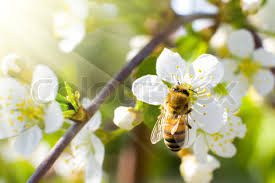Bees in your garden
Did Memorial Day weekend give you time to go outside to enjoy the flowers and the trees and the birds and the bees? Have you bought new plants and put them in the ground? Did you enjoy fresh fruit, berries or nuts? If you did any of these things, thank a honey bee.
“By some counts, pollinators such as bees and butterflies are responsible for one out of every three bites of food Americans eat. Honey bees in particular are responsible for pollinating many of our super-foods: the berries, nuts, avocados, and many other colorful and nutrient-rich fruits and vegetables that make up the healthiest parts of our diet.” –Earth Justice
 Commercially farmed bees are “hired” to pollinate almond, fruit, and other farms. Without this pollination, there is no fruit, no nuts. This is not just about a honey shortage. The use of pesticides, particularly neonicotinoid pesticide, is implicated in the large-scale die-off of honey bees in the United States.
Commercially farmed bees are “hired” to pollinate almond, fruit, and other farms. Without this pollination, there is no fruit, no nuts. This is not just about a honey shortage. The use of pesticides, particularly neonicotinoid pesticide, is implicated in the large-scale die-off of honey bees in the United States.
What can you do at home?
If you are planting flowering plants in an effort to be good to the birds and the bees, think again. Large chains, like Lowes and Home Depot are treating their plants with neonicotinoids. These chemicals are suspected to damage worker bees’ ability to navigate, so they get lost and die. (Other insecticides caused bees to die in large number near their hives.)
Be aware of what you are buying. Ask at your plant nursery what insecticides they use. Or buy organic plants at a local farmer’s market, or swap plants with other gardeners who have overgrown plants that need thinning.
If you need to use pesticides in your garden, avoid these bee-killing pesticides, especially for flowering plants.
